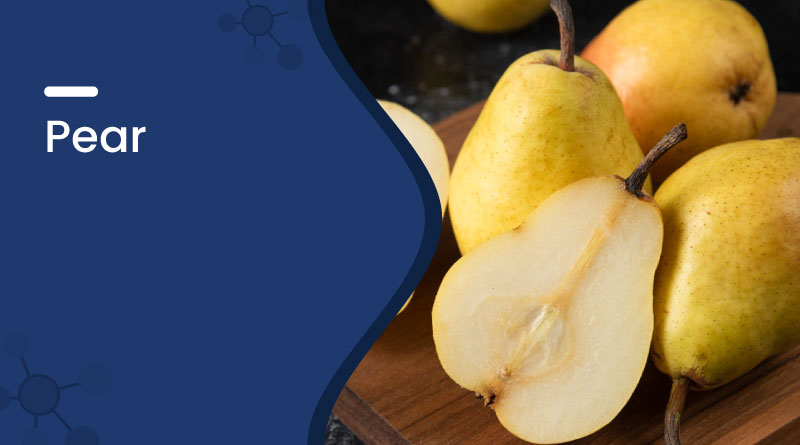Pear Fruit Benefits & Nutrition | Sweet & Healthy Snack


Pear, called Nashpati in Hindi and Amritaphala in Sanskrit, means “immortal fruit.” It is sweet, juicy, and full of water, making it ideal for digestion, hydration, and heart health. In Ayurveda, it cools the body and balances Pitta and Vata doshas. Pear is moistening, softening, and gentle on the gut. Whether eaten fresh, stewed, or juiced, it helps with regular digestion, tissue repair, and natural cleansing from within.
Importance of Pear in Ayurveda
Pear is important in Ayurveda as a Sattvic fruit that calms the mind and supports vitality. Its cooling, hydrating nature helps reduce body heat, soothe inflammation, and aid digestion. With high fiber and a soft texture, it's ideal during fevers, constipation, or gut issues. Pear also supports heart, skin, and urinary health while gently detoxifying the body.
Nutritional Value of Pear
| Nutrient | Value per 100g |
|---|---|
| Calories | 57 kcal |
| Carbs | 15.2 g |
| Protein | 0.36 g |
| Fiber | 3.1 g |
| Cholesterol | 0 mg |
| Vitamins | A (1 µg), B6 (0.03 mg), C (4.3 mg) |
| Sodium | 1 mg |
| Total Fat | 0.14 g |
(Source: https://www.signos.com/foods/pear-glycemic-index#nutritional-facts)
Benefits of Pear
Pear for Indigestion and Constipation
Pear is rich in dietary fiber, particularly insoluble fiber, which helps bulk up stool and promote regular bowel movements. Its soft, hydrating nature soothes irritated intestines, making it ideal for people with IBS, colitis, or chronic constipation. Ayurveda views pear as a mild anulomana (natural laxative) that supports Apana Vayu and colon health.
Pear for Dryness and Body Heat
Pear is an excellent natural hydrator. It helps balance Pitta dosha, cools down body heat, and soothes burning sensations—whether from acid reflux, skin inflammation, or urinary issues. During summer or in hot climates, consuming pears helps prevent dehydration and heat exhaustion.
Pear for Heart Problems
Pears are a heart-friendly fruit. They contain soluble fiber (like pectin), which helps lower LDL cholesterol and improve lipid metabolism. In Ayurveda, sweet and juicy fruits are said to nourish Rasa Dhatu (plasma) and Hridaya (heart). The antioxidants in pears, including quercetin and catechins, reduce inflammation and oxidative stress on blood vessels.
Pear for Weight Control
Though sweet, pears are low in calories and high in fiber, making them satisfying yet light. They reduce hunger pangs and improve satiety. Pears also have a low glycemic index, which helps maintain stable blood sugar and prevent insulin spikes—ideal for those managing weight or prediabetes.
Pear for Dull Skin and Acne
Pear supports clear, radiant skin by hydrating the body and purifying the blood. Its vitamin C and antioxidant content promote collagen synthesis, while its detoxifying properties help reduce acne and dullness. In Ayurveda, fruits like pear are seen as “internal moisturizers” that nourish the skin from within.
Pear for Low Immunity
Although not a vitamin C powerhouse, pear contains phytonutrients, copper, and modest amounts of vitamin C that help the body fight infections. It builds Ojas—the vital essence responsible for immunity, vitality, and endurance. Regular consumption keeps the body resilient, especially during seasonal changes.
Pear for Urinary Concerns
Pears act as a gentle diuretic, supporting kidney function and relieving mild urinary discomfort. Its cooling nature helps manage burning urination, especially in Pitta aggravation or mild UTIs. Ayurveda classifies it as a Mutravirechaka—a fruit that aids urine flow and flushes toxins.
Pear for Fever and Recovery
Soft, stewed pears are often recommended during convalescence and fever. They hydrate, provide gentle nutrition, and support the rebuilding of weakened tissues. Their cooling, moist nature soothes dryness, fatigue, and internal heat, making them a rejuvenative post-illness food.
How to Use Pear: Forms, Dosage & Methods
| Dosage Form | Benefits | How to Use |
|---|---|---|
| Fresh Pear | Digestion, hydration, immunity | 1 medium pear daily as a snack or part of a meal |
| Stewed Pear | Fevers, constipation, gut healing | Peel and stew with cinnamon; consume warm |
| Pear Juice | Cooling, detox, skin | 100 ml freshly extracted juice, once a day |
| Pear Smoothie | Weight loss, energy | Blend with yogurt or plant milk for a breakfast smoothie |
| Dried Pear | Travel, snack, fiber | A handful of unsweetened dried slices |
Safety Tips for Using Pear
-
Allergies: Rare but possible. If allergic to apples or birch pollen, be cautious.
-
Cold or Kapha Imbalance: In cold weather or with high mucus, eat pear in cooked form.
-
Diabetes: Eat whole pears instead of juice to retain fiber and minimize sugar spikes.
-
Babies & Toddlers: Always give peeled, cooked pear for better digestion and safety.
Final Thoughts
Pear is a sweet fruit with many health benefits. It helps digestion, keeps the body hydrated, cares for the skin, and supports the heart. Easy to eat in many ways, pear gently cleanses the body and balances Pitta in Ayurveda.
Frequently Asked Questions (FAQs)
Q: Can pear help relieve constipation?
A: Yes, its fiber and moist texture make it ideal for relieving mild to moderate constipation naturally.
Q: Is a pear good for Pitta dosha?
A: Absolutely. Pear’s cooling and sweet qualities help pacify aggravated Pitta.
Q: Can diabetics eat pears?
A: Yes, in moderation. Whole pears have a low glycemic index and are safer than pear juice.
Q: Is it safe to give pear to babies?
A: Yes, cooked and mashed pear is excellent as a first food for babies.
Q: What is the best time to eat pear?
A: Mid-morning or as a mid-afternoon snack is ideal for digestion and energy.
Recent Blogs
Disclaimer : Zeelab Pharmacy provides health information for knowledge only. Do not self-medicate. Always consult a qualified doctor before starting, stopping, or changing any medicine or treatment.
Related Products
Need Medicines Quick?
Share location to check quick delivery serviceability.
Change Location
Location Access Needed
Your location appears to be blocked or disabled.
Please enable the location from your browser or
device settings.

₹ 0
0
Items added
Quick Links
Categories
Our Policies
2026 Copyright By © Zeelab Pharmacy Private Limited. All Rights Reserved
Our Payment Partners

 Added!
Added!
|
|













